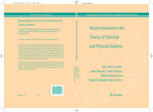

Most ebook files are in PDF format, so you can easily read them using various software such as Foxit Reader or directly on the Google Chrome browser.
Some ebook files are released by publishers in other formats such as .awz, .mobi, .epub, .fb2, etc. You may need to install specific software to read these formats on mobile/PC, such as Calibre.
Please read the tutorial at this link: https://ebookbell.com/faq
We offer FREE conversion to the popular formats you request; however, this may take some time. Therefore, right after payment, please email us, and we will try to provide the service as quickly as possible.
For some exceptional file formats or broken links (if any), please refrain from opening any disputes. Instead, email us first, and we will try to assist within a maximum of 6 hours.
EbookBell Team

4.7
46 reviewsAdvances in the Theory of Chemical and Physical Systems
Proceedings of the 9th European Workshop on Quantum Systems in Chemistry and Physics (QSCP-IX) held at Les Houches, France, in September 2004
Pr J.-P. Julien, Dr J. Maruani, Pr D. Mayou, Dr S. Wilson, and Pr G. Delgado-Barrio
Advances in the Theory of Chemical and Physical Systems is a collection of 26 selected papers from the scientific presentations made at the 9th European Workshop on Quantum Systems in Chemistry and Physics (QSCP-IX) held at Les Houches, France, in September 2004. This volume encompasses a spectrum of developing topics in which scientists place special emphasis on theoretical methods in the study of chemical and physical properties of various systems:
Quantum Chemical Methods (including CC and DFT for excited states)
Relativistic and Heavy-Element Systems (including radiative and nuclear effects)
Complexes and Clusters (including metal complexes and clusters)
Complex Systems (including quasicrystals, nanotubes and proteins)
This volume is an invaluable resource for all academics and researchers interested in theoretical, quantum or computational chemistry, physical chemistry and chemical physics, particularly molecular physics, condensed matter, heavy elements, complexes and clusters, and complex systems. It presents a selection of some of the most advanced methods, results and insights in these expanding areas.